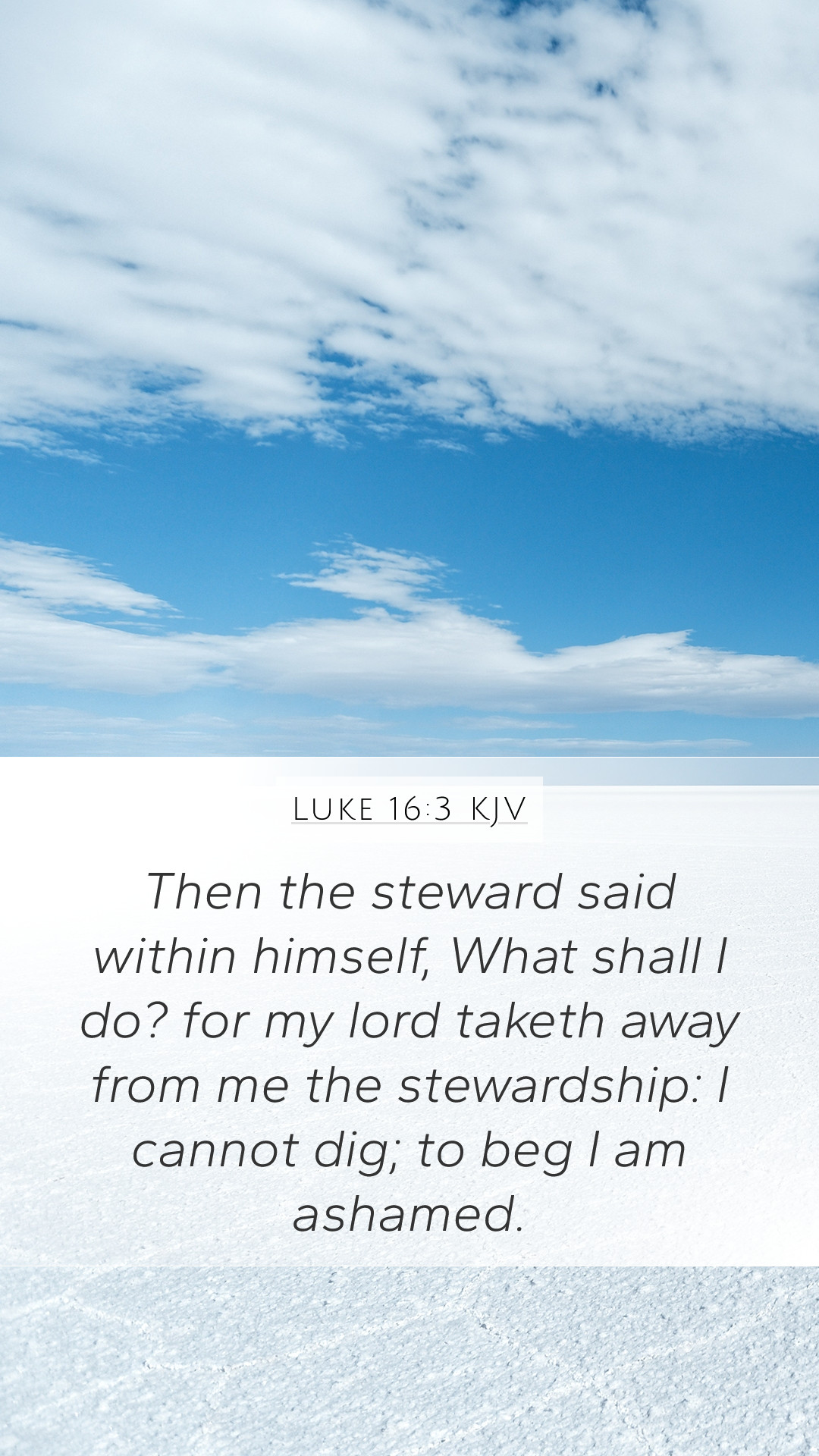Bible Verse Meaning: Luke 16:3
In the Gospel of Luke, specifically in Luke 16:3, we encounter a parable that delves into themes of stewardship and accountability. The verse states:
“Then the steward said within himself, What shall I do? for my lord taketh away from me the stewardship: I cannot dig; to beg I am ashamed.”
This verse unfolds in the context of a rich man who learns about the mismanagement of his assets by a steward, prompting the steward to reflect on his dire situation. Let’s explore the biblical interpretations and deeper meanings derived from renowned public domain commentaries.
Analysis and Commentary
-
Matthew Henry's Commentary
Matthew Henry emphasizes the internal struggle of the steward in this passage. He notes that the steward acknowledges his impending loss of position and feels unworthy of begging or performing manual labor. This reveals his pride and fear of humiliation, showcasing human tendencies when faced with adversity.
-
Albert Barnes' Notes
Albert Barnes expands on the notions of accountability and resourcefulness. He argues that the steward's realization that he will soon lose his job prompts a wisdom that is often lacking. Barnes suggests that this moment serves as a lesson on the importance of utilizing one’s resources wisely and preparing for the future, warning readers of the urgent need for prudence in their spiritual and temporal affairs.
-
Adam Clarke's Commentary
Adam Clarke interprets the steward's actions as a reflection of the human heart's tendency to seek self-preservation. Clarke points out that the steward's consideration of his options underscores a crucial principle: the necessity of being proactive about one’s spiritual and material responsibilities.
Key Themes
- Stewardship and Accountability: The verse highlights the theme of stewardship, encouraging individuals to take responsibility for their actions and the resources entrusted to them.
- Human Pride: The steward’s reluctance to beg illustrates the pride that often accompanies human struggle, raising questions about humility and dependency on God.
- Preparation for the Future: The steward’s planning intends to prepare for a life post-stewardship, urging readers to consider their own futures and spiritual lives.
In-Depth Bible Study Insights
Luke 16:3 offers much more than a narrative about a steward; it invites an in-depth Bible verse analysis that can enhance a reader’s understanding of Scripture:
- Application of Bible Verses to Daily Life: This verse prompts believers to think critically about the roles they fulfill in life and encourages reflection on how these roles honor or dishonor God.
- Understanding Difficult Bible Passages: The complexities within this parable hint at deeper theological truths regarding stewardship and the nature of earthly versus heavenly treasures.
- Historical Context of Bible Verses: Understanding the socio-economic backdrop of first-century Judea aids in appreciating the profound nature of stewardship depicted in this verse.
Conclusion
In conclusion, Luke 16:3 serves as a powerful reminder of the importance of stewardship, the struggles of pride and humility, and the necessity to prepare for what lies ahead in both our material and spiritual walks. By engaging with this verse through various Bible study tools, readers can deepen their Bible verse understanding, facilitate discussions in Bible study groups, and foster an environment for meaningful online Bible study.
Related Scripture References
- Matthew 25:14-30: The Parable of the Talents emphasizes the responsibility of managing God-given resources.
- Luke 12:42-48: The parable of the faithful steward aligns with the theme of accountability.
- Proverbs 27:23-24: Highlights the importance of knowing the condition of one's flocks and the value of stewardship.


